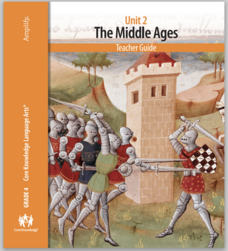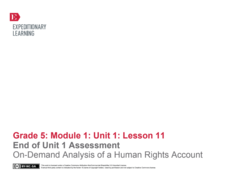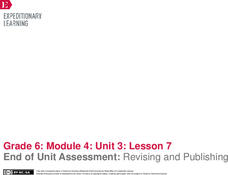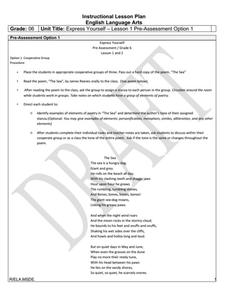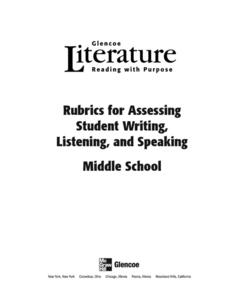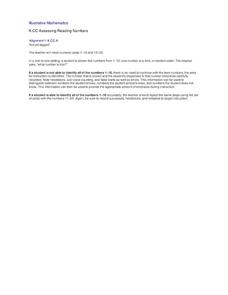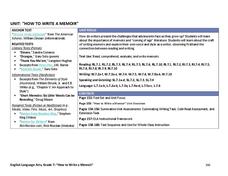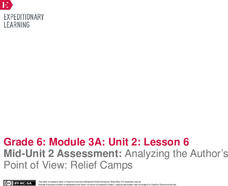Mary Pope Osborne, Classroom Adventures Program
Mummies in the Morning Egyptian pyramids, hieroglyphics
Visit the Magic Treehouse and take your class on a trip through time with a reading of the children's book Mummies in the Morning. Using the story to spark an investigation into Egyptian culture, this literature unit engages...
Clark County School District
Owl Moon by Jane Yolen
A thorough lesson plan takes your first grade class through Jane Yolen's beautiful Owl Moon. It crafts the unit with clear objectives, high-level guiding questions, cloze activities and sentence frames, and extension activities at the...
Core Knowledge Foundation
The Civil War
A unit focuses on the Civil War. Second graders follow along with an informational reading about the war—why it started, how it ended, and essential individuals such as Harriet Beecher Stow, Harriet Tubman, Abraham Lincoln, Ulisses, S....
Core Knowledge Foundation
Second Grade Skills Unit 6: The War of 1812
An English language arts unit closely examines spelling, grammar, reading, and writing skills. Scholars practice spelling patterns and tricky words. A read-aloud details the War of 1812 and introduces adverbs, and a close reading looks...
Core Knowledge Foundation
Third Grade Skills Unit 3: How Does Your Body Work?
A skills unit combines ELA and science with lessons that explore the human body. Lessons begin with a reading, go into skills practice, and offer take-home materials. Skills practice includes listening to and discussing a read-aloud,...
Core Knowledge Foundation
Unit 2: The Middle Ages
Over four weeks, fourth graders read and discuss texts about the Middle Ages. They practice vocabulary, spelling, and grammar, such as nouns, adjectives, and verbs. Writing opportunities allow learners to boost their note-taking skills...
Core Knowledge Foundation
Third Grade Skills Unit 5: Adventures in Light and Sound
Light and sound are the themes of a unit focused on third-grade skills. Scholars practice spelling patterns, grammar—adverbs, adjectives, synonyms, writing sentences with conjunctions, and listening and responding to read-aloud. Over...
Core Knowledge Foundation
Third Grade Skills Unit 10: Living in Colonial America
Over three weeks, third graders participate in lessons designed to boost spelling and grammar skills—adjectives, adverbs, and pronouns—and prefixes. Readings are themed to share stories about Colonial America.
Core Knowledge Foundation
Third Grade Skills Unit 8: Native American Storiess
An interdisciplinary unit focuses on third-grade ELA skills and Native American stories. Over two weeks, scholars practice spelling patterns, work with plural possessive nouns and suffixes, and identify between its and it's. Readings...
EngageNY
On-Demand End of Unit Assessment and Bookmark Celebration
Using everything they have learned about writing paragraphs over the past few lessons of the unit, class members compose an informative paragraph independently. This is an authentic assessment of their ability, since learners have...
Illustrative Mathematics
Assessing Sequencing Numbers
Assess whether your kindergartners can identify numbers in random order using two sets of numeral cards 1-10 and 11-20. Starting with a small group and the 1-10 deck give your learners the task of putting the cards into order from...
EngageNY
End of Unit 3 Assessment: Writing a Research Synthesis
Ready, set, write! Scholars work on the end-of-unit assessment by completing a writing prompt. They then look at the model performance task from instructional activity two to create a rubric for scoring the exercise. Using turn and talk,...
EngageNY
End of Unit 1 Assessment: On-Demand Analysis of a Human Rights Account
The last instructional activity in this unit about human rights consists of a final assessment. To demonstrate the skills your class has acquired throughout this unit, they will work with a new article entitled "From Kosovo to the United...
EngageNY
Mid-Unit Assessment: Text-Dependent and Short Answer Questions: Excerpts from “A Limited Supply”
There's no such thing as an unlimited resource. Scholars complete a mid-unit assessment by reading A Limited
Supply. They answer text-dependent questions and complete a graphic organizer about key terms in the text.
Curated OER
Indiana Applied Skills Assessment Sample
In this Applied Skills Assessment worksheet, 5th graders complete a sample state assessment for Language Arts and Mathematics for 5th graders. They read a writing prompt and complete a writing activity that follows, answer various types...
EngageNY
End of Unit Assessment: Revising and Publishing
Dictionaries, thesauruses, word walls, oh my! Pupils use several resources to revise their position papers to include appropriate vocabulary. Then, after peer editing, scholars write the final drafts of their essays and self-assess using...
EngageNY
Mid-Unit 3 Assessment: On-Demand Note-Taking about Howler Monkeys
Get the facts straight. Scholars complete their mid-unit assessment by reading a text, watching a video, and observing a picture about howler monkeys. They take notes about the facts they discover to use in future lessons.
EngageNY
Talking with My Peers: Carousel of Reading Superheroes Around the World
In many places in the world, people go to great lengths to get books to read. This beginning-of-the-year activity uses pictures of people reading in extraordinary situations to stimulate effective listening and speaking using the...
Curated OER
Express Yourself Pre Assessment Lesson 1 & 2
Find out how much your class knows about literary elements with a quick pre-assessment. Pupils work first individually to identify the instances of personification, metaphor, simile, and more, and then with group members to determine the...
Curated OER
Rubrics for Assessing Student Writing, Listening, and Speaking Middle School
This is a fantastic collection of a wide variety of rubrics for writing, listening, and speaking! The resource contains over 14 rubrics for assessing such items as a summary, autobiographical sketch and narrative, speech, oral report,...
Illustrative Mathematics
Assessing Reading Numbers
Youngsters develop their number sense by rote counting from one to ten. Over time, they identify the numbers on their own and no longer rely on fixed recitation. Using numerical flashcards, a teacher will randomly choose numbers from the...
Louisiana Department of Education
How to Write a Memoir
Who are we and what shapes our identities? Seventh graders work to answer this question as they learn how to write a memoir. Full of non-print resources and supplemental texts that range from fiction to non-fiction, scholars write their...
EngageNY
Mid-Unit 2 Assessment: Analyzing the Author’s Point of View: Relief Camps
We're halfway there ... what a relief! Scholars read an excerpt from a primary source about the relief camps associated with the1906 San Francisco earthquake. Next, they complete a mid-unit assessment, answering short-answer and...
EngageNY
Reading about the Author’s Perspective: Why Do Authors Write about Natural Disasters?
It's all about perspective. Scholars view a note from the author in Eight Days. They determine the gist and discuss what they can learn about the author's background based on the note. They then complete a fishbowl activity in which they...
Other popular searches
- Reading Assessment Test
- Reading Assessment Retelling
- Reading Assessment Rubrics
- Authentic Reading Assessment
- Informal Reading Assessments
- Pearson Reading Assessments
- Reading Assessments Tests
- Reading Assessment Phonics
- Reading Assessment Pre Test
- Ongoing Reading Assessment
- Reading Assessment Pre Test
- Early Reading Assessments







